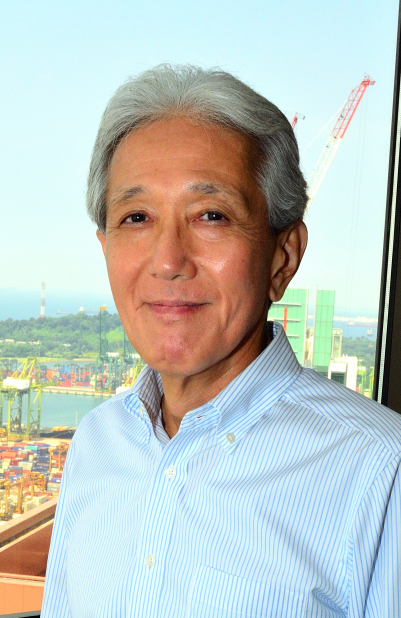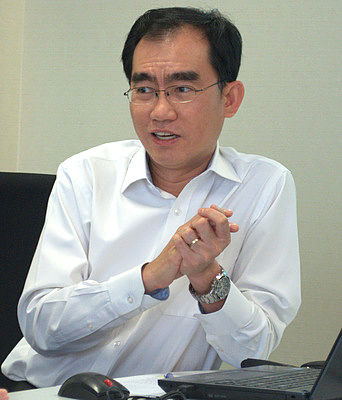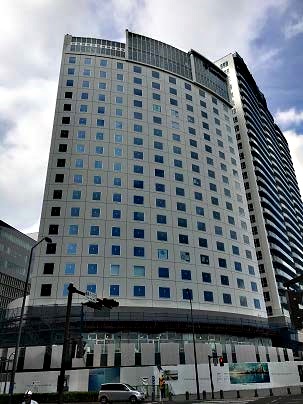|
When Uni-Asia lifts its suspension this Friday (2 June), its shares will trade under an entity incorporated in Singapore instead of the Cayman Islands.
 “We are an alternative investment fund. We have been gradually building up each business segment over the past 20 years. From time to time, we look at selling our business for a good price.” “We are an alternative investment fund. We have been gradually building up each business segment over the past 20 years. From time to time, we look at selling our business for a good price.”
- Michio Tanamoto
Chairman and CEO
Uni-Asia Holdings
(NextInsight file photo)
|
“Being a Singapore-incorporated entity gives a certain comfort level to investors,” said CFO Lim Kai Ching at a 1Q2017 results briefing on Thursday (25 May).
“Changing the listing entity to Uni-Asia Group gives us flexibility in fund raising, in leasing out our shipping or property entities, and in restructuring,” he said.
Previously, the listing entity, Uni-Asia Holdings, carried much of the Group’s operating activities, headcount and investments. That made it difficult for business segregation should the Group want to spin-off a business segment.
The restructuring comes ahead of expectations of strong contribution from its new property and hotels business segment over the next 2 years.
|
Profitable Hong Kong project
 "We will receive very strong cash flow from our second HK property project early next year," said CFO Lim Kai Ching.
"We will receive very strong cash flow from our second HK property project early next year," said CFO Lim Kai Ching.
(NextInsight file photo)The Group's US$10 million investment to develop a commercial-cum-retail project at Cheung Sha Wan, New Kowloon is scheduled for completion this year.
This is its second Hong Kong property development project.
The launch last month was well received: About 80% of the development has been sold, which will be recognized as fair valuation gain.
"The land for this project was acquired for less than HK$5,000 per square foot in 2014. A site near Cheung Sha Wan was sold a few months ago by the Hong Kong government to New World Development for about HK$8,000 per square foot," said CEO and Chairman Michio Tanamoto, who was also at the meeting.
Given the substantial appreciation in the market value of real estate, the management expects a healthy margin for this project.
Strong momentum in hotel contracts
 Hotel Vista Premio Yokohama Minato-Mirai is scheduled for a grand opening on 30 June 2017. (Photo: Company)
Hotel Vista Premio Yokohama Minato-Mirai is scheduled for a grand opening on 30 June 2017. (Photo: Company)
The Group is planning to increase its hotel management capacity by about 60% over the next 12 months.
It is currently operating 10 business hotels with about 1,600 rooms all over Japan.
Another 6 hotels with about 1,000 rooms will be added to its hotel operation business in Japan by next summer.
"We need at least 3,000 rooms for this segment to contribute to the bottomline. The six new hotels increase our capacity to about 2,600 rooms and that brings us very close to this target," said Mr Lim.
Some of the Group's other businesses include vessel charter, shipbroking, arrangement of ship finance, and property investment management in Japan. It posted a consolidated net profit of US$2.1 million for 1QFY2017, reversing a loss of US$616,000 for 1QFY2016. Its latest results announcement may be viewed here.
| ♦ Q & A with Mr Tanamoto and Mr Lim |
|
Q: What do you hope to achieve with 3,000 hotel rooms?
Mr Tanamoto: We will incur pre-opening expenses for the 6 new hotels this year and the next. We are expecting bottomline contribution of at least US$3 million a year from hotel management starting from 2019. That is significant in view of our total net profit.
| Stock price |
$1.20 |
| 52-week range |
93.5c - $1.27 |
| Market cap |
$56.4m |
| PE (ttm) |
- |
| Dividend yield |
2.5% |
| P/BV |
0.3 |
| Data: Company / Bloomberg |
Q: Are the parties responsible for the various costs of the hotel management defined in your agreement with its owner?
Mr Tanomoto: We lease the hotel building and pay a leasing fee to its owner.
The leasing fee is a combination of a fixed rental rate plus a variable component. We try to negotiate for a low fixed rental rate to lower our risk. The variable component is dependent on the hotel’s gross operating profit.
Q: What expenses are not charged to the owner?
Mr Lim: The gross operating profit is the difference between the hotel’s revenue and its operating expenses. We take a cut of the gross operating profit. The cut varies for each hotel. The contribution from this segment is dependent on the sum of each hotel’s gross operating profit less our HQ expenses.
Each hotel is actually quite profitable on a standalone basis. However, expenses at the HQ level incurred by the employment of personnel to ensure the quality of each hotel, as well as to source for new hotel contracts, reduce the segment’s bottom line.
Our target of 3,000 rooms ensures a reasonable bottom line contribution from each hotel after deduction of HQ expenses.
Q: Why is the first quarter a slow season for your hotel segment?
Mr Lim: Our hotels are business hotels. There tends to be less business travel in January and February. Hotel occupancy picks up in March and April during the Sakura season.
|
 "We will receive very strong cash flow from our second HK property project early next year," said CFO Lim Kai Ching.
"We will receive very strong cash flow from our second HK property project early next year," said CFO Lim Kai Ching. Hotel Vista Premio Yokohama Minato-Mirai is scheduled for a grand opening on 30 June 2017. (Photo: Company)
Hotel Vista Premio Yokohama Minato-Mirai is scheduled for a grand opening on 30 June 2017. (Photo: Company)






